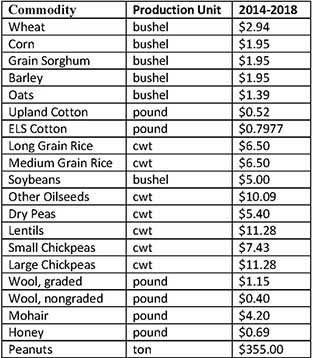|
 Remember, whenever you have questions you can always contact
your local FSA office offices.usda.gov, look online at the FSA
website www.fsa.usda.gov or ask a specific question online at
http://askfsa.custhelp.com/. Remember, whenever you have questions you can always contact
your local FSA office offices.usda.gov, look online at the FSA
website www.fsa.usda.gov or ask a specific question online at
http://askfsa.custhelp.com/.
Administrative Policy
Reminders
Firearms and Dangerous Weapons Forbidden In Federal
Facilities
USDA Service Centers and Farm
Service Agency Offices are Off Limits for Firearms
This is an important reminder to all customers and patrons of
USDA Farm Service Agency (FSA) offices and USDA Service Centers
statewide that firearms are forbidden (even with a
permit/license) in Federal Buildings. A Federal Building by
definition is any building owned, leased or rented by the
Federal Government, where Federal employees are regularly
present for the purpose of performing their official duties.
The items that are prohibited in Federal facilities include any
item prohibited by any applicable Federal, State, local, and
tribal law and/or ordinance, as well as firearms, dangerous
weapons, explosives, or other destructive devices (including
their individual parts or components) designed, redesigned,
used, intended for use, or readily converted to cause injury,
death, or property damage. Possession of firearms and dangerous
weapons in Federal facilities as outlined above is a crime
punishable by fines and imprisonment.

For a complete list of items prohibited in Federal facilities,
please view and/or download the document titled, Items
Prohibited from Federal Facilities: An Interagency Security
Committee Standard: http://www.dhs.gov/sites/default/files/publications/isc-items-prohibited-federal-facilities-feb-2013-508.pdf.
The lists of prohibited items outlined in this document apply to
all facility occupants, contractors, and the visiting public.
If you have questions or concerns regarding this notification,
please contact your local Farm Service Agency office–http://offices.usda.gov.
Changing Bank Accounts
All FSA payments should be electronically transferred into your
bank account. In order to make timely payments, you need to
notify the office if you close your account or if your bank is
purchased by another financial institution. Payments can be
delayed if we are not aware of changes to account and routing
numbers.
Civil Rights/Discrimination Complaint Process
As a participant or applicant for programs or activities
operated or sponsored by USDA you have a right to be treated
fairly. If you believe you have been discriminated against
because of your race, color, national origin, gender, age,
religion, disability, or marital or familial status, you may
file a discrimination complaint. The complaint should be filed
with the USDA Office of Civil Rights within 180 days of the date
you became aware of the alleged discrimination. To file a
complaint of discrimination write USDA, Director, Office of
Civil Rights, Room 326W, Whitten Building, 14th and Independence
Avenue, SW, Washington DC 20250-9410 or call 202-720-5964 (voice
or TDD), USDA is an equal opportunity provider, employer and
lender. A complaint must be filed within 180 calendar days from
the date the complainant knew, or should have known, of the
alleged discrimination.
Nondiscrimination Statement
The U.S. Department of Agriculture (USDA) prohibits
discrimination in all its programs and activities on the basis
of race, color, national origin, age, disability, and where
applicable, sex, marital status, familial status, parental
status, religion, sexual orientation, genetic information,
political beliefs, reprisal, or because all or a part of an
individual’s income is derived from any public assistance
program. (Not all prohibited bases apply to all programs.)
Persons with disabilities who require alternative means for
communication of program information (Braille, large print,
audiotape, etc.) should contact USDA’s TARGET Center at (202)
720-2600 (voice and TDD). To file a complaint of discrimination
write to USDA, Director, Office of Civil Rights, 1400
Independence Avenue, S.W., Washington, D.C. 20250-9410 or call
(800) 795-3272 (voice) or (202) 720-6382 (TDD). USDA is an equal
opportunity provider, employer and lender.

Power of Attorney
For those who find it difficult to visit the county office
personally because of work schedules, distance, health, etc.,
FSA has a power of attorney form available that enables you to
designate another person to conduct your business at the office.
If you are interested, please contact our office or any Farm
Service Agency office near you for more information. Power of
Attorney provisions do not apply to farm loan programs.
Special Accommodations
Special accommodations will be made upon request for individuals
with disabilities, vision impairment or hearing impairment. If
accommodations are required, individuals should contact the
county FSA office directly or by phone.
Farm Program Policy Reminders
Annual Review of Payment Eligibility for New Crop Year
All participants of FSA programs who request program benefits
are required to submit a completed CCC-902 (Farming Operation
Plan) and CCC-941 Average Gross Income (AGI) Certification and
Consent to Disclosure of Tax Information to be considered for
payment eligibility and payment limitation applicable for the
program benefits.
Participants are not required to annually submit new CCC-902s
for payment eligibility and payment limitation purposes unless a
change in the farming operation occurs that may affect the
determination of record. A valid CCC-902 filed by the
participant is considered to be a continuous certification used
for all payment eligibility and payment limitation
determinations applicable for the program benefits requested.
Participants are responsible for ensuring that all CCC-902 and
CCC-941 and related forms on file in the county Office are
correct at all times. Participants are required to timely notify
the county office of any changes in the farming operation that
may affect the determination of record by filing a new or
updated CCC-902 as applicable.
Changes that may require a NEW determination include, but are
not limited to, a change of:
- Shares of a contract, which may reflect:
- A land lease from cash rent to share rent
- A land lease from share rent to cash rent (subject
to the cash rent tenant rule)
- A modification of a variable/fixed bushel-rent
arrangement

- The size of the producer’s farming operation by the
addition or reduction of cropland that may affect the
application of a cropland factor
- The structure of the farming operation, including
any change to a member's share
- The contribution of farm inputs of capital, land,
equipment, active personal labor, and/or active personal
management
- Farming interests not previously disclosed on
CCC-902 including the farming interests of a spouse or
minor child
- Financial status that may affect the 3-year average
for the determination of average AGI or other changes
that affects eligibility under the average adjusted
gross income limitations.
Participants are encouraged to file or review these forms within
the deadlines established for each applicable program for which
program benefits are being requested.
Payment Limitation
Program payments are limited by direct attribution to
individuals or entities. A legal entity is defined as an entity
created under Federal or State law that owns land or an
agricultural commodity, product or livestock. Through direct
attribution, payment limitation is based on the total payments
received by the individual, both directly and indirectly.
Qualifying spouses are eligible to be considered separate
persons for payment limitation purposes, rather than being
automatically combined under one limitation.
Payments and benefits under certain FSA programs are subject to
some or all of the following:
- payment limitation by direct attribution
- payment limitation amounts for the applicable
programs
- actively engaged in farming requirements
- cash-rent tenant rule
- foreign person rule
- average AGI limitations
- programs subject to AGI limitation
- effective date of implementation of AGI
limitation
No program benefits subject to payment eligibility and
limitation will be provided until all required forms for the
specific situation are provided and necessary payment
eligibility and payment limitation determinations are made.
Payment eligibility and payment limitation determinations may be
initiated by the County Committee or requested by the producer.

There are statutory provisions that require entities, earning
program benefits that are subject to limitation, to provide the
names, addresses, and TINs of the entities’ members to the
County Committee.
All applicable payment eligibility and payment limitation forms
submitted by producers are subject to spot check through the
end-of-year review process.
Producers selected for end-of-year review must provide the
County Committee with operating loan documents, income and
expense ledgers, canceled checks for all expenditures, lease and
purchase agreements, sales contracts, property tax statements,
equipment listings, lease agreements, purchase contracts,
documentation of who provided actual labor and management,
employee time sheets or books, crop sales documents, warehouse
ledgers, gin ledgers, corporate or entity papers, etc.
A determination of not actively engaged in farming results in
the producer being ineligible for any payment or benefit
requiring a determination of actively engaged in farming
Noncompliance with AGI provisions, either by exceeding the
applicable limitation or failure to submit a certification and
consent for disclosure statement, will result in the
determination of ineligibility for all program benefits subject
to AGI provisions. Program benefits shall be reduced in an
amount that is commensurate with the direct and indirect
interest held by an ineligible person or legal entity in any
legal entity, general partnership, or joint operation that
receives benefits subject to the average AGI limitations.
If any changes occur that could affect an actively engaged in
farming, cash-rent tenant, foreign person, or average Adjusted
Gross Income (AGI) determination, producers must timely notify
the county Office by filing revised farm operating plans and/or
supporting documentation, as applicable. Failure to timely
notify the County Office may adversely affect payment
eligibility.
Acreage Reporting
Filing an accurate crop and acreage report at your local FSA
office can prevent the loss of benefits for a variety of
programs. Failed acreage is acreage that was timely planted with
the intent to harvest, but because of disaster related
conditions, the crop failed before it could be brought to
harvest.
Prevented planting must be reported no later than 15 days after
the final planting date. Annual acreage reports are required for
most Farm Service Agency programs. Annual crop report deadlines
vary based on region, crop, perennial vs. annual crop type, NAP
or non-NAP crop and fall or winter seeding. Consult your local
FSA office for deadlines in your area.
To be eligible for the Agriculture Risk Coverage (ARC) and Price
Loss Coverage (PLC) program or a Marketing Assistance Loan (MAL)
or Loan Deficiency Payment (LDP), producers must submit an
acreage report to account for all cropland on all farms.

Change in Farming Operation
If you have bought or sold land, or if you have picked up or
dropped rented land from your operation, make sure you report
the changes to the office as soon as possible. You need to
provide a copy of your deed or recorded land contract for
purchased property. Failure to maintain accurate records with
FSA on all land you have an interest in can lead to possible
program ineligibility and penalties. Making the record changes
now will save you time in the spring. Update signature
authorization when changes in the operation occur. Producers are
reminded to contact the office if there is a change in
operations on a farm so that records can be kept current and
accurate.
Controlled Substance
Program participants convicted under federal or state law of any
planting, cultivating, growing, producing, harvesting or storing
a controlled substance are ineligible for program payments and
benefits. If convicted of one of these offensives, the program
participant shall be ineligible during that crop year and the
four succeeding crop years for price support loans, loan
deficiency payments, market loan gains, storage payments, farm
facility loans, Non-insured Crop Disaster Assistance Program
payments or disaster payments.
Program participants convicted of any federal or state offense
consisting of the distribution (trafficking) of a controlled
substance, at the discretion of the court, may be determined
ineligible for any or all program payments and benefits:
- for up to 5 years after the first conviction
- for up to 10 years after the second
conviction
- permanently for a third or subsequent
conviction
Program participants convicted of federal or state offense for
the possession of a controlled substance shall be ineligible, at
the discretion of the court, for any or all program benefits, as
follows:
- up to 1 year upon the first conviction
- up to 5 years after a second or
subsequent conviction
Reconstitutions
To be effective for the current Fiscal Year (FY), farm
combinations and farm divisions must be requested by August 1 of
the FY for farms subject to the Agriculture Risk Coverage (ARC)
and Price Loss Coverage (PLC) program. A reconstitution is
considered to be requested when all:
- of the required signatures are on
form FSA-155
- other applicable documentation, such
as proof of ownership, is submitted
Total Conservation Reserve Program (CRP) and non-ARC/PLC farms
may be reconstituted at any time.
Farm Service Agency (FSA) and Risk Management Agency (RMA) to
Prevent Fraud, Waste, and Abuse
FSA supports the RMA in the prevention of fraud, waste and abuse
of the Federal Crop Insurance Program. FSA has been, and will
continue to, assist RMA and insurance providers by monitoring
crop conditions throughout the growing season. FSA will continue
to refer all suspected cases of fraud, waste and abuse directly
to RMA. Producers can report suspected cases to the county
office staff, the RMA office or the Office of the Inspector
General.

FAV/Wild Rice Exception
Planting fruits, vegetables (FAVs) or wild rice on payment acres
enrolled in the ARC and PLC Program is prohibited unless the
commodity is destroyed without benefit before harvest. Producers
may plant FAV’s and/or wild rice on payment acres if the FAV
and/or wild rice is planted in a double- cropping practice with
covered commodities in any region designated in the 7 Code of
Federal Regulations (7 CFR) as having a history of
double-cropping covered commodities or peanuts with FAVs and/or
wild rice. Failure to comply with FAV and wild rice provisions
will result in an acre-for-acre payment reduction.
Foreign Buyers Notification
The Agricultural Foreign Investment Disclosure Act (AFIDA)
requires all foreign owners of U.S. agricultural land to report
their holdings to the Secretary of Agriculture. Foreign persons
who have purchased or sold agricultural land in the county are
required to report the transaction to FSA within 90 days of the
closing. Failure to submit the AFIDA form could result in civil
penalties of up to 25 percent of the fair market value of the
property. County government offices, realtors, attorneys and
others involved in real estate transactions are reminded to
notify foreign investors of these reporting requirements.
Adjusted Gross Income Requirements
The average adjusted gross income (AGI) limitation for commodity
and disaster programs under the 2014 Farm Bill was changed to a
$900,000 limitation from all income sources. A person or legal
entity, other than a joint venture or general partnership, is
eligible to receive, directly or indirectly, certain program
payments or benefits if the average adjusted gross income of the
person or legal entity falls below the $900,000 threshold for
the three taxable years preceding the most immediately preceding
complete taxable year. However, the AGI limitation for
conservation programs may be waived on a case-by-case basis if
it is determined that environmentally sensitive land of special
significance would be protected.

[to top of second column] |

Signature Policy
Using the correct signature when doing business with FSA can
save time and prevent a delay in program benefits. The following
are FSA signature guidelines:
- A married woman shall sign her given name: Mrs. Mary Doe,
not Mrs. John Doe
- For a minor, FSA requires the minor's signature and one from
an eligible parent
Note, by signing the applicable document, the parent is liable
for actions of the minor and may be liable for refunds,
liquidated damages, etc.
When signing on one’s behalf the signature must agree with the
name typed or printed on the form, or be a variation that does
not cause the name and signature to be in disagreement. Example
- John W. Smith is on the form. The signature may be John W.
Smith or J.W. Smith or J. Smith. Or Mary J. Smith may be signed
as Mrs. Mary Joe Smith, M.J. Smith, Mary Smith, etc.
FAXED signatures will be accepted for certain forms and other
documents provided the acceptable program forms are approved for
FAXED signatures. Producers are responsible for the successful
transmission and receipt of FAXED information.
Examples of documents not approved for FAXED signatures include:
- Promissory note
- Assignment of payment
- Joint payment authorization
- Acknowledgement of commodity certificate purchase
Spouses may sign documents on behalf of each other for FSA and
CCC programs in which either has an interest, unless written
notification denying a spouse this authority has been provided
to the county office.
Spouses shall not sign on behalf of each other as an authorized
signatory for partnerships, joint ventures, corporations or
other similar entities.

Any member of the general partnership can sign on behalf of the
general partnership and bind all members unless the Articles of
Partnership are more restrictive. Spouses may sign on behalf of
each other’s individual interest in a partnership, unless
notification denying a spouse that authority is provided to the
county office. Acceptable signatures for general partnerships,
joint ventures, corporations, estates, and trusts shall consist
of an indicator “by” or “for” the individual’s name,
individual’s name and capacity, or individual’s name, capacity,
and name of entity.
For additional clarification on proper signatures contact your
local FSA office.
ARC/PLC Acreage Maintenance
Producers enrolled in the Agriculture Risk Coverage (ARC) or
Price Loss Coverage (PLC) programs must protect all cropland and
noncropland acres on the farm from wind and water erosion and
noxious weeds. Producers who sign ARC county or individual
contracts and PLC contracts agree to effectively control noxious
weeds on the farm according to sound agricultural practices. If
a producer fails to take necessary actions to correct a
maintenance problem on a farm that is enrolled in ARC or PLC,
the County Committee may elect to terminate the contract for the
program year.
Conservation Reserve Program (CRP) - Annual Certification
Before an annual rental payment can be issued, participants must
certify to contract compliance using either the FSA-578, Report
of Acreage, or CCC-817U, Certification of Compliance for CRP.
Beginning with 2016, once certified, a CRP acreage report is
considered continuous unless there is a CRP revision. Annual
reports on FSA-578 or CCC-817U are not required in this case.
Highly Erodible Land (HEL) and Wetland Conservation
Compliance
Landowners and operators are reminded that in order to receive
payments from USDA, compliance with Highly Erodible Land (HEL)
and Wetland Conservation (WC) provisions are required. Farmers
with HEL determined soils are reminded of tillage, crop residue,
and rotation requirements as specified per their conservation
plan. Producers are to notify the USDA Farm Service Agency prior
to conducting land clearing or drainage projects to insure
compliance. Failure to obtain advance approval for any of these
situations can result in the loss of eligibility and all Federal
payments.
Highly Erodible Land and Wetland Conservation Certification Must
be Filed to Receive FSA Benefits
The 2014 Farm Bill requires farmers to have a Highly Erodible
Land Conservation and Wetland Conservation Certification
(AD-1026) on file with their local Farm Service Agency (FSA)
office in order to maintain eligibility for premium support on
federal crop insurance.

Since enactment of the 1985 Farm Bill, eligibility for most
commodity, disaster and conservation programs has been linked to
compliance with the highly erodible land conservation and
wetland conservation provisions. The 2014 Farm Bill continues
the requirement that producers adhere to conservation compliance
guidelines to be eligible for most programs administered by FSA
and the Natural Resources Conservation Service (NRCS). This
includes financial assistance from the Agriculture Risk Coverage
(ARC) and Price Loss Coverage (PLC) programs, the Conservation
Reserve Program (CRP), livestock disaster assistance programs,
Marketing Assistance Loans (MALs) and most programs implemented
by FSA. It also includes the Environmental Quality Incentives
Program (EQIP), the Conservation Stewardship Program and other
conservation programs implemented by NRCS.
If you have not submitted the AD-1026 form, please do so before
the June 1, 2017 deadline.
When a farmer completes and submits the AD-1026 certification
form, FSA and NRCS staff will review the associated farm records
and outline any additional actions that may be required to meet
the required conservation compliance provisions.
Form AD-1026 is available at USDA Service Centers and online at:
www.fsa.usda.gov. Please contact your local USDA Service Center
for more information.
Nonrecourse Marketing Assistance Loans and Loan Deficiency
Payments
Nonrecourse Marketing Assistance Loans (MALs) and Loan
Deficiency Payments (LDPs) are available to eligible producers
for the 2016 crop year for wheat, corn, grain sorghum, barley,
oats, upland cotton, extra-long staple cotton, long grain rice,
medium grain rice, soybeans, other oilseeds (including sunflower
seed, rapeseed, canola, safflower, flaxseed, mustard seed,
crambe and sesame seed), dry peas, lentils, small chickpeas,
large chickpeas, graded and non-graded wool, mohair, unshorn
pelts, honey and peanuts.
To be eligible for a MAL or LDP, producers must comply with
conservation and wetland protection requirements and submit an
acreage report to account for all cropland on all farms.
Additionally, they must have and retain beneficial interest in
the commodity until the MAL is repaid or the Commodity Credit
Corporation (CCC) takes title to the commodity while also
meeting Adjusted Gross Income (AGI) limitations.
In addition to producer eligibility, the commodity must have
been produced, mechanically harvested, or shorn from live
animals by an eligible producer and be in storable condition. It
also must be merchantable for food, feed or other uses, as
determined by CCC. Nonrecourse MALs must meet specific CCC
minimum grade and quality standards.

If beneficial interest in the commodity is lost, the commodity
loses eligibility for a MAL or LDP and remains ineligible even
if the producer later regains beneficial interest. To retain
beneficial interest, the producer must have control and title to
the commodity. The producer must be able to make all decisions
affecting the commodity including movement, sale and the request
for a MAL or LDP. The producer must not have sold or delivered
the commodity or warehouse receipt to the buyer.
Producers are responsible for any loss in quantity or quality of
commodities pledged as collateral for a farm-stored or warehouse
stored loan. CCC will not assume any loss in quantity or quality
of the loan collateral regardless of storage location.
The 2014 Farm Bill sets national loan rates. County and regional
loan rates are based on each commodity’s national loan rate, and
they vary by county or region and are based on the average
prices and production of the county or region where the
commodity is stored.
National loan rates for 2014-2018 crops (per production unit)
are as follows:

NOTE: The upland cotton loan rate is subject to change for 2017
and 2018.
For all loan-eligible commodities except extra-long staple (ELS)
cotton, a producer may repay a MAL any time during the loan
period at the lesser of the loan rate plus accrued interest and
other charges or an alternative loan repayment rate as
determined by CCC.

Producers may obtain MALs or receive LDPs on all or part of
their eligible production anytime during the loan availability
period. The loan availability period runs from when the
commodity is normally harvested (or sheared for wool) until
specified dates in the following calendar year.
The final loan/LDP availability dates for the respective
commodities are:
- Jan. 31 - Peanuts, Wool, Mohair and LDP only for
Unshorn Pelts
- March 31 - Barley, Canola, Crambe, Flaxseed, Honey,
Oats, Rapeseed, Sesame seed and Wheat
- May 31 - Corn, Dry peas, Grain sorghum, Lentils,
Mustard seed, Long grain rice, Medium grain rice,
Safflower, Small chickpeas, Large chickpeas, Cotton,
Soybeans and Sunflower seed
Measurement Service
Farmers who would like a guarantee on their crop plantings and
land use acreages can make it official by using the FSA
measurement service. Producers must file a request with the
county office staff and pay the cost of a field visit to have
stake and referencing done on the farm. Measurement service is
available using digital imagery. If an on-site visit is not
required producers are charged a reduced rate.
Incorrect acreage self-certification can result in reduced
program payments, penalty or loss of eligibility.
Farm Loan Policy Reminders
Loans for Targeted Underserved Producers
FSA has a number of loan programs available to assist applicants
to begin or continue in agriculture production. Loans are
available for operating purposes and/or to purchase or improve
farms or ranches. While all qualified producers are eligible to
apply for these loan programs, the FSA has provided priority
funding for underserved applicants. An underserved applicant is
one of a group whose members have been subjected to racial,
ethnic or gender prejudice because of his or her identity as
members of the group without regard to his or her individual
qualities. For purposes of this program, underserved groups are
women, African Americans, American Indians, Alaskan Natives,
Hispanics, Asian Americans, and Pacific Islanders. If producers
or their spouses believe they would qualify as underserved, they
should contact their local FSA office for details. FSA loans are
only available to applicants who meet all eligibility
requirements and are unable to obtain the needed credit
elsewhere.

Disaster Set-Aside (DSA) Program
FSA borrowers with farms located in designated primary or
contiguous disaster areas who are unable to make their scheduled
FSA loan payments should consider the Disaster Set-Aside (DSA)
program.
DSA is available to producers who suffered losses as a result of
a natural disaster and is intended to relieve immediate and
temporary financial stress. FSA is authorized to consider
setting aside the portion of a payment/s needed for the
operation to continue on a viable scale. Borrowers must have at
least two years left on the term of their loan in order to
qualify.
Borrowers have eight months from the date of the disaster
designation to submit a complete application. The application
must include a written request for DSA signed by all parties
liable for the debt along with production records and financial
history for the operating year in which the disaster occurred.
FSA may request additional information from the borrower in
order to determine eligibility.
All farm loans must be current or less than 90 days past due at
the time the DSA application is complete. Borrowers may not set
aside more than one installment on each loan.
The amount set-aside, including interest accrued on the
principal portion of the set-aside, is due on or before the
final due date of the loan.
For more information, contact your local FSA farm loan office.
Farm Loan Graduation Reminder
FSA Direct Loans are considered a temporary source of credit
that is available to producers who do not meet normal
underwriting criteria for commercial banks.
FSA periodically conducts Direct Loan graduation reviews to
determine a borrower’s ability to graduate to commercial credit.
If the borrower’s financial condition has improved to a point
where they can refinance their debt with commercial credit, they
will be asked to obtain other financing and partially or fully
pay off their FSA debt.
By the end of a producer’s operating cycle, the Agency will send
a letter requesting a current balance sheet, actual financial
performance and a projected farm budget. The borrower has 30
days to return the required financial documents. This
information will be used to evaluate the borrower’s potential
for refinancing to commercial credit.
If a borrower meets local underwriting criteria, FSA will send
the borrower’s name, loan type, balance sheet and projected cash
flow to commercial lenders. The borrower will be notified when
loan information is sent to local lenders.

If any lenders are interested in refinancing the borrower’s
loan, FSA will send the borrower a letter with a list of lenders
that are interested in refinancing the loan. The borrower must
contact the lenders and complete an application for commercial
credit within 30 calendar days.
If a commercial lender rejects the borrower, the borrower must
obtain written evidence that specifies the reasons for rejection
and submit to their local FSA farm loan office.
If a borrower fails to provide the requested financial
information or to graduate, FSA will notify the borrower of
noncompliance, FSA’s intent to accelerate the loan, and appeal
rights.
Questions?
Please contact your local FSA Office.
[USDA Farm Service Agency] |